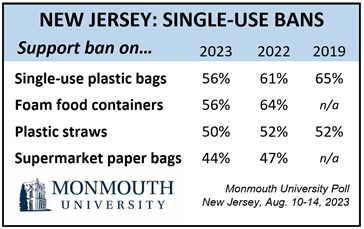Insider NJ: Monmouth Poll Reveals Ongoing Support for Plastic Bag Ban in NJ, with Some Concerns
A recent Monmouth University poll conducted in New Jersey has revealed that a majority of residents continue to support the state’s plastic bag ban, which was implemented in 2020. However, the survey also highlighted some concerns and areas of improvement that policymakers should consider.
The poll, which surveyed 604 New Jersey adults, found that 59% of respondents still support the plastic bag ban, while only 34% oppose it. This indicates a sustained level of public support for the measure, even after it has been in effect for over a year.
The plastic bag ban, which prohibits retailers from providing single-use plastic bags to customers, aims to reduce environmental pollution and promote the use of reusable bags. It is part of a broader effort to address the growing concern over plastic waste and its detrimental impact on ecosystems.
Supporters of the ban argue that it has been successful in reducing plastic bag usage and promoting environmentally friendly alternatives. They believe that the inconvenience caused by the ban is a small price to pay for the long-term benefits it offers in terms of reducing pollution and protecting wildlife.
However, the Monmouth poll also shed light on some concerns raised by residents regarding the ban. One of the main concerns expressed by respondents was the lack of consistency in its implementation across different stores and municipalities. Some participants reported confusion about which types of bags are allowed and where they can be used.
This inconsistency in enforcement has led to frustration among consumers who feel uncertain about how to comply with the ban. To address this issue, policymakers should consider providing clearer guidelines and ensuring consistent implementation across the state.
Another concern raised by respondents was the potential health risks associated with reusable bags. Some participants expressed worries about the cleanliness of these bags and the potential for cross-contamination, particularly during the ongoing COVID-19 pandemic.
To alleviate these concerns, it is crucial to educate the public about proper bag hygiene and maintenance. Encouraging regular washing of reusable bags and providing guidelines on how to keep them clean can help address these worries and ensure the safe use of reusable alternatives.
Overall, the Monmouth poll indicates that the plastic bag ban in New Jersey continues to enjoy public support, reflecting a growing awareness of the need to reduce plastic waste. However, it also highlights the importance of addressing concerns related to consistency in implementation and potential health risks.
By addressing these concerns and providing clearer guidelines, policymakers can enhance the effectiveness of the ban and ensure a smoother transition towards a more sustainable future. With ongoing public support, New Jersey’s plastic bag ban can serve as a model for other states looking to tackle the issue of plastic pollution and promote environmentally friendly practices.



